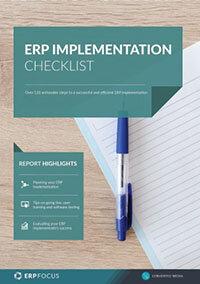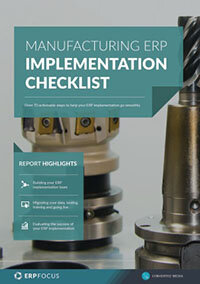5 Ways ERP Implementation Can Boost Business Success
ERP systems are no longer confined to sprawling corporations and businesses. Now even small-to-medium-sized enterprises are tapping into its capabilities. But what specific areas of your business could be boosted by a successful ERP implementation?
More Efficient Supply Chains
Businesses can improve the efficiency of both the up- and downstream supply chains with through ERP implementation. Tackling the paperwork mountain becomes a little bit easier, as forms and files can be replaced by electronic equivalents. Greater efficiency means that orders and BoM can be electronically submitted to suppliers. Tracking the supply chain within your ERP system will also give your company greater supply traceability and accountability.
The consequences of speeding up and streamlining communications between supplier and customer include lower lead times, faster order fulfilment and more prompt settlement of invoices.
Better Internal Communications
This may not be a benefit that suggests itself immediately, but nevertheless it is one of the key advantages of implementing ERP. Manual processing by its nature introduces errors and inconsistencies. When a software system is used to record updates and communicate with key stakeholders automatically, everyone can stay fully informed at all times.
“Once you get instantaneous communication with everybody, you have economic activity that's far more advanced, far more liquid, far more distributed than ever before.” — Marc Andreessen (American entrepreneur and software engineer)
Efficiency of Business Processes
Don’t expect implementing an ERP system to suddenly make your business magically efficient. The software is a tool for enforcing and maintaining efficiency. The very process of implementing an ERP system will make it essential to review business processes and optimise them for best performance.
Streamlined Systems
Several different computer programmes, different spreadsheets used by different departments, multiple attachments and versions of the same document doing the email rounds… Any of this sound familiar? Bringing together existing ‘silos’ of information during your ERP implementation is a way to reduce costs, errors, conflicting information and time wastage.
Higher Revenue
The famous bottom line is also given a boost by effective implementation of ERP. As mentioned previously, costs and losses can be reduced significantly due to efficiency savings. However, ERP can also be used by a business to increase income. Better customer service standards and speedier order fulfilment directly improves the potential for repeat orders and loyalty. In addition, uniting the data with CRM functions can help to alert the team to future sales opportunities, which can then be pursued by the sales team.
A Word of Warning...
In the interests of a balanced view, it’s important to not simply focus on the miracles of ERP. Despite the benefits of implementing a good ERP system, there are also several pitfalls that you should watch out for.
by Paul Bywater, Managing Director of Sanderson
Free white paper

ERP Implementation: 9 steps to success
The 9 proven steps you should follow when implementing ERP

Featured white papers
-

ERP Implementation: 9 steps to success
The 9 proven steps you should follow when implementing ERP
Download -

ERP Implementation Checklist
Over 120 actionable steps to implementing a new ERP successfully
Download -

Manufacturing ERP Implementation Checklist
Over 70 actionable steps to rolling out new manufacturing ERP software
Download
Related articles
-

ERP implementation plan (ERP implementation process guide)
Everything you need to know about running a successful ERP implementation - and we mean everything
-

Secret KPI: Why Your ERP Implementation Team Matters More Than Software
Learn how Godlan ensures successful ERP implementation for manufacturers with proven strategies &...
-

The case for multi-tier ERP implementations
Learn more about multi-tier ERP implementation and why you might need one

